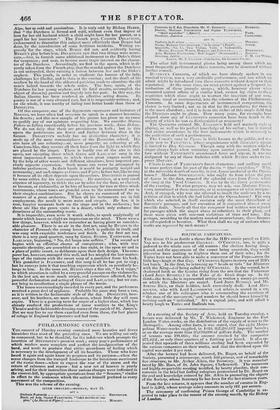PHILHARMONIC CONCERTS..
THE concert of Monday evening contained more beauties and fewer blemishes than most of the preceding ones. We are willing not only to compound, but to be thankful, for the indolence which prompts the insertion of Bieritovee's greatest work ; every year's performance of which renders more complete and perfect the amalgamation of the band, and tends to produce that entire accordance of feeling which is necessary to the development of all its beauties. Those who have heard it again and again know its progress and its purpose—when the scene changes from the tranquil landscape to the boisterous merriment of the rustic dance—when to expect the roar of the storm and the return of calmness and repose : but a new set of hearers is yearly arising, and for their instruction these various changes were indicated in the concert-bill, by appropriate quotations from the " Seasons," similar in effect to the sentences which the author himself prefixed to every movement of the composition. This was the scheme of the evening.
SIXTH CONCERT—MONDAY, MAY 11.
ACT 1.
Sitifonia Pastorale BEETHOVEN.
ed Aria. signor TA MitURINT, " VIR1ro mentre-io 509 Pim." (Le .Plerze di Fisaro) MOZART. Concerto in E flat, Pi/1110fOrte, Mr. W. BENNETT Burma llnetto, Madame FINCKI.OHR and Signor TAMBURINI, Quel sepolehro" (Agnes..) PAM. Overture, Anacreon CR 6RUDINI.
ACT II.
Sinf.nia in minor
Scout. Madame SToCtCHAUSEN, "Silo sento " (Faust)
Qoartetto, (No. 1..), Two Violins, Viola, e Violoncello,
Me,srs. ELtaSoN, WATTS, MORAL'S% anti t.ii,t FY BEETHOVEN. Aria, Madame FINcti LOU a," Bch' raggio" (Semiramide) Rossi NI. Overture, Jubilee C. M. VON WEBE7Z.
Lester, Mr. F. CILINIER—COlidUCtOr, Sir GEORGE SM ART.
The other full instrumental pieces being among those which are most frequently performed at these concerts, may be dismissed without further remark.
BENNETT'S Concerto, of which we have already spoken in our musical review, was a very creditable performance, and one which we admit might be introduced into these concerts without danger to their reputation. At the same time, we must protest against a frequent in- troduction of these juvenile essays ; which, however clever when measured against others of a similar kind, cannot lay claim to these requisites which alone ought to warrant the insertion of any corn. position, vocal or instrumental, into the schemes of the Philharmonic Concerts. In some departments of instrumental composition, the choice is very limited ; not so in that for the pianoforte, for there it is the most abundant ; and it is from the riches of this ample field that the Directors ought to glean. How many years, for example, have elapsed since any of CLEMENTI'S concertos have been heard in the society of which he was so distinguished an ornament ? The Quartetto evinced Mr. ELIASON'S bold and masterly style of playing, as well as his perfect knowledge of his author ; but it wattled that entire accordance in the four instruments which is necessary to the perfection of such a performance.
MO7ART. SPOHB.
The Count's song in Figaro is little known to the public, and vies quite new to TAMBURINI, whose acquaintance with MozAnT's operas is limited to Don Gi,:vanni. Though sung with the caution which a singer always feels when venturing upon untried ground, and there- fore without TAMBURINI'S accustomed force and vigour, it was not disfigured by any of those fooleries with which RUBINI seeks to im- prove MOZART.
Uherto is one of TAMBVRINT'S finest characters ; and nothing could be more perfect than his part of the (Nett° " Quel sepolchro." Why, in the miserable dearth of novelty, is not Agnese produced at the Opera- house ? Madame STOCKHAUsEN, who ought to have taken the part of alenese in the duet, repeated the splendid SCC111 from I'anse which she sung at the Vocal Concerts. It was by far finest performance of the evening. To what purpose, may we ask, was Aladatne FINCK- LOIIR introduced at these concerts, or in consequence of what intrigue: And, if engaged, why was she allowed to insult the audience by a re-
petition of that in which she had failed at the Opera-house? The song which she selected, in itself contains only the most threadbare of
ROSSINI'S passages, and her execution of it comprized almost every possible fault. Nearly all that the composer had written was rejected for passages which the singer chose to substitute in their place, and these were given with eonstant violations of time and tune. But perhaps, according to the modern musical nomenclature, these licences are all regarded as beauties. What then shall we say of authors whose works are improved by such means ?


























 Previous page
Previous page